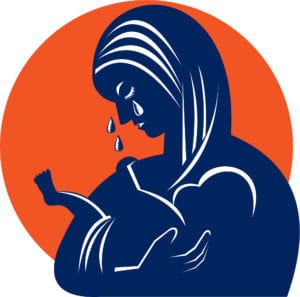
Postpartum depression can affect over 3 million women every single year, affecting 3 to 6 percent of all women throughout their lifetime.
Postpartum depression — also known as Major Depressive Disorder with Peripartum Onset and sometimes referred to as perinatal depression — is a form of depression that occurs after pregnancy and can drastically alter a woman’s way of life, causing intense mood changes that can lead those who suffer to feel hopeless and broken.
Many of the symptoms associated with PPD are very similar to general depression, but others are only experienced by women who have recently been pregnant. The symptoms listed below list some of the signs that may indicate that you or someone you know is suffering from postpartum depression, but are not always experienced by every individual suffering from PPD.
Signs of Postpartum Depression

-
Mood Changes
Feelings of sadness, hopeless, emptiness, worrying and anxiety are all symptoms of PPD. Keep an eye out for them following a pregnancy.
-
Sleeping Trouble
Any changes to normal sleeping patterns, particularly sleeping trouble, can be indicators of postpartum depression.
-
Moodiness
Moodiness, restlessness, anger and rage are all behaviors commonly experienced in postpartum depression changes.
-
Appetite Changes
Appetite and eating habits changes are common in PPD patients and are often used to diagnose PPD.
-
Unexplained Crying
Women who cry for no reason or cry more than usual shortly after pregnancy could be suffering from postpartum depression.
-
Aches and Pains
Aches and pains throughout the body are commonly experienced by women suffering from PPD.
-
Negative Thoughts About Motherhood Or Her Child
Sometimes mothers experience doubt in their ability to care for their child or even thoughts of physical harm to themselves or their child. This is a sign that immediate help should be sought.
If someone you know appears to be suffering from postpartum depression, the most important thing you can do is talk to them about how they’re feeling. Encourage them to get some professional advice about how to cope with PPD, as a little treatment can go a long way in helping patients manage their postpartum depression.
At Lehigh Center, we are currently running a postpartum depression clinical trial to help treat patients for PPD and learn more about what the medical community to do to better treat mothers suffering from postpartum depression.
About Lehigh Center
The Lehigh Center for Clinical Research is a Lehigh Valley-based independently run research facility that conducts clinical trials to evaluate investigational treatments for a number of disorders, including postpartum depression. Want to learn more about the clinical trials offered at Lehigh Center? Click the link below!
